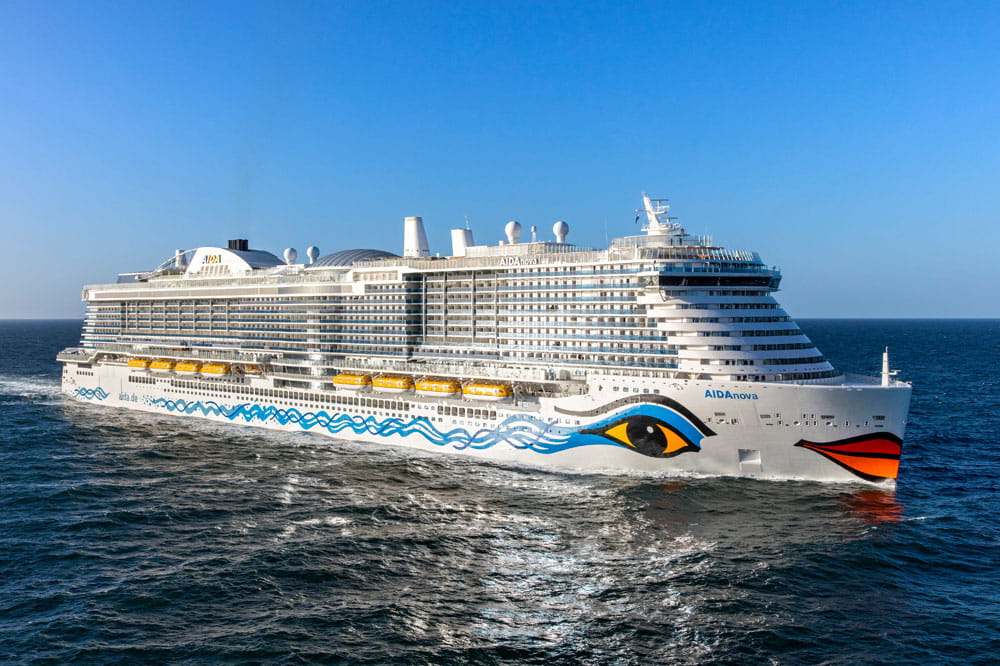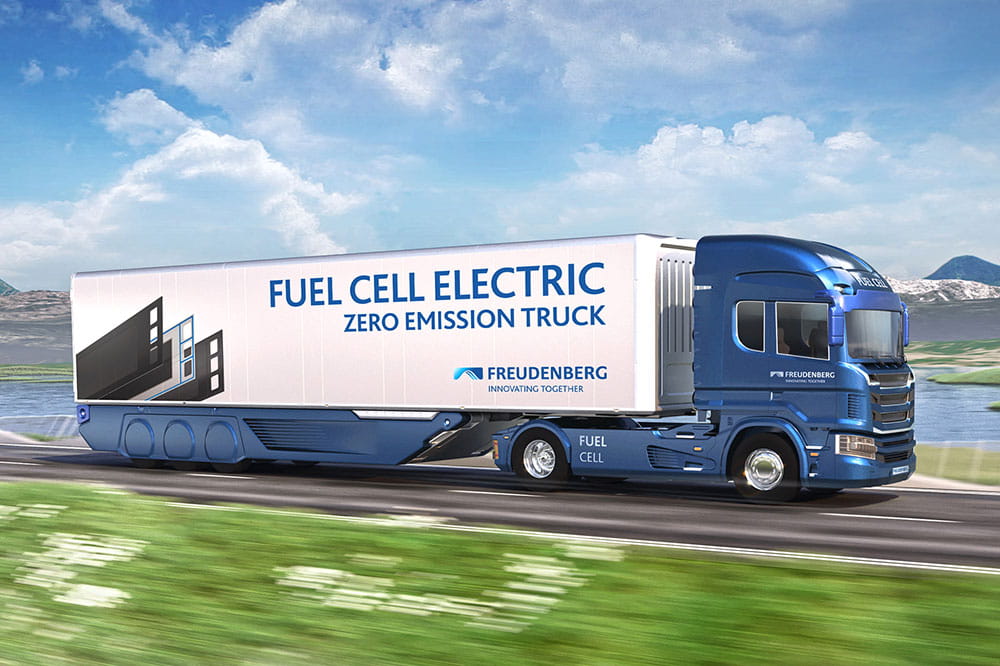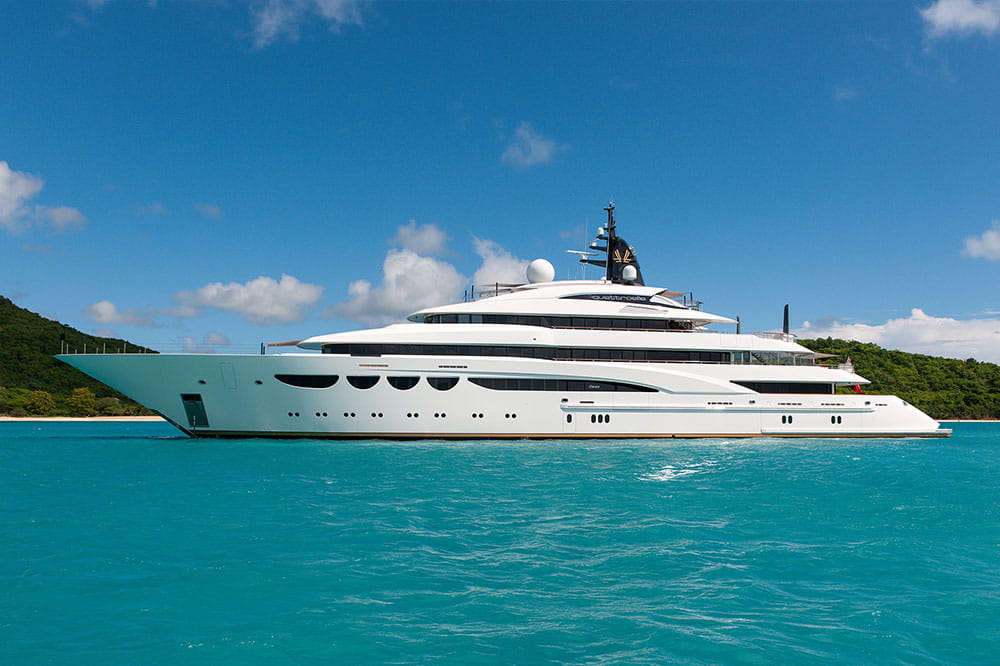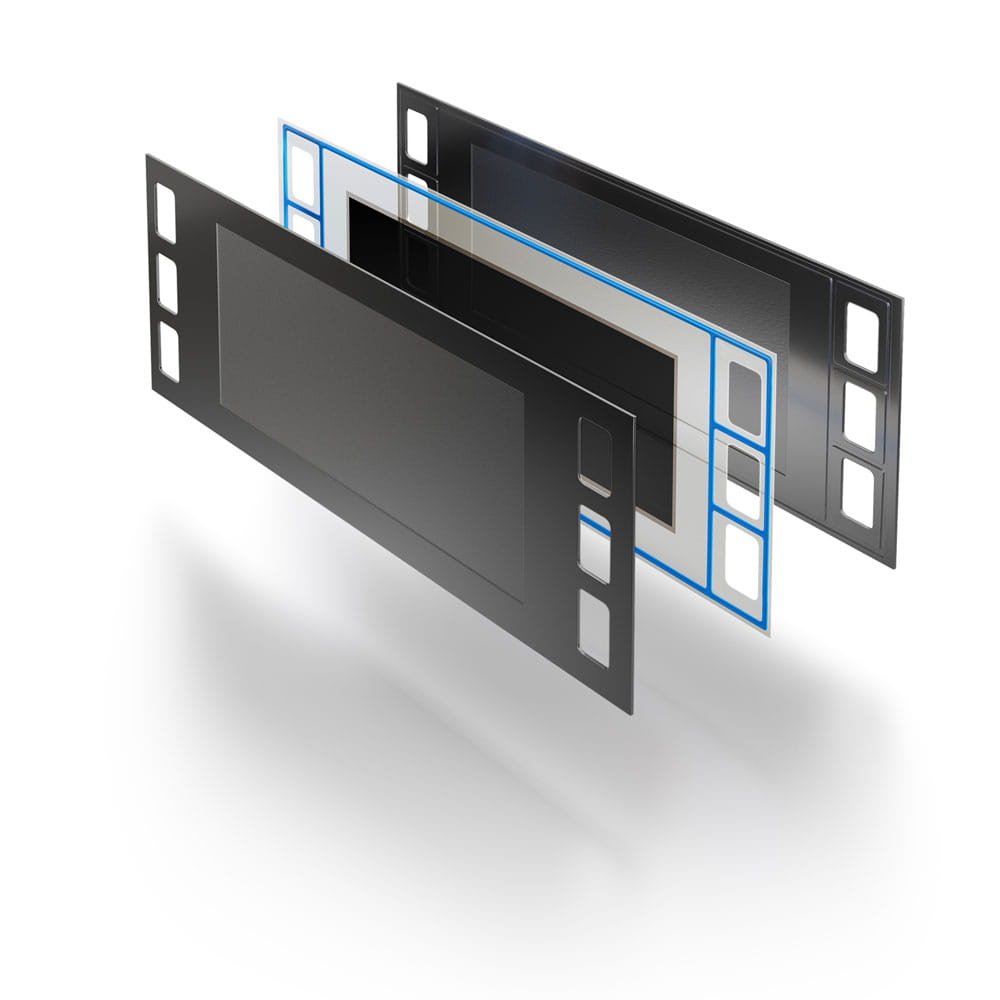Obtain news and background information about sealing technology, get in touch with innovative products – subscribe to the free e-mail newsletter.

Fuel Cell Technology Products & Systems
Complete Fuel Cell Systems for Carbon-Neutral, Heavy-Duty Applications
Fuel cell technology from Freudenberg Fuel Cell e-Power Systems offers a breakthrough in clean, reliable alternate powertrain options for the transportation and other essential industries. Passenger ferries, yachts, container ships, trucks and passenger buses will all go farther, work harder and generate fewer CO2 emissions in a future that runs on fuel cell energy. When extreme power, long-term reliability, optimal total cost of ownership and sustainability are paramount, Freudenberg offers unparalleled quality solutions to keep your products moving.
Reinforced by more than 30 years of fuel cell research and development, Freudenberg’s offers technologically superior fuel cell solutions harness the company’s world-class materials, testing and engineering capabilities. The company provides heavy-duty application manufacturers with a single point of contact for all of their fuel cell needs, from functional components to complete fuel cell systems. This includes all necessary subsystems (balance-of-plant) and services such as telematics, remote monitoring, field service and cost-optimized refurbishment of stacks. Freudenberg's expertise not only covers low-temperature PEM fuel cells (LTPEM), which are commonly used in transportation, but also high-temperature PEM fuel cells (HTPEM).
Fuel Flexibility As Unique Selling Point
Every customer has unique system requirements and Freudenberg Fuel Cell e-Power Systems are manufactured to optimize system flexibility. Fuel flexibility for maritime customers, in particular, is a unique company strength. For ships with long range requirements, Freudenberg offers both classic direct hydrogen systems and systems with integrated fuel reformers. The integrated reformers enable ships to use carbon-neutral fuels with higher energy density, such as e-methanol. With this proprietary technology, Freudenberg offers its maritime customers years of reliable, carbon-neutral ocean travel that is sustained by the superior service life and flexibility of its fuel cell systems.
The Freudenberg fuel cell portfolio also offers another impressive technological solution to customers: A hybrid system that seamlessly combines the advantages of a battery and fuel cell in one power solution. These hybrid designs maximize fuel efficiency, performance and service life while lowering investment costs. Freudenberg is the only supplier on the market with the deep technological expertise required in both fuel cells and batteries systems and components to engineer and integrate these power sources into intelligent hybrid systems. It goes without saying that the company also develops an intelligent energy management solution for these systems, in accordance with ISO26262 standards.
Multiple Benefits for System Operators
Freudenberg offers the market unique in-house, value-added benefits in every hybrid solution it engineers. Whether starting with a separator and cell and finishing with a complete battery system or starting with gas diffusion layers, a membrane electrode assembly (MEA) and a stack and finishing with a fuel cell, Freudenberg systems can be modularly assembled with different performance levels depending upon the required performance profiles. For system operators, this means higher efficiency, better suitability for everyday use and cost advantages in terms of total cost of ownership.
Freudenberg Fuel Cell e-Power Systems offers complete electric power systems to customers that are environmentally friendly, provide maximum power and cost efficiency, are reliable "long-distance runners" and combine low weight and flexible installation designs. As a single source supplier of all fuel cell requirements, Freudenberg Fuel Cell e-Power Systems is ready to partner with you to power up your future success.
Markets

Truck & Bus
The globally active technology specialist and Europe's largest provider of long-distance coach travel are working together in a future-oriented project on sustainable, CO2-free mobility. Together they are bringing fuel cell-powered coaches onto the road.
Learn more
Marine
The technical requirements for the performance, reliability and durability of fuel cells used in a marine applications are higher than for those used on land. Freudenberg offers modular, individually configurable fuel cell systems and integrated hybrid drive systems that optimize the sizing of fuel cell and battery.
Learn moreCompetencies
More than two and a Half Decades of Experience With Fuel Cells and Batteries
The Freudenberg family of businesses has more than 170 years of industrial design and manufacturing experience. The company is focused on innovation, product excellence, quality, value and customer service. With 50,000 associates in 60 countries, Freudenberg businesses respond regionally with global solutions.
For more than 20 years, Freudenberg has pursued the development of functional relevant components for fuel cells. Gas diffusion layers (GDL), for example, increase the flow efficiency of reactant hydrogen, air and oxygen and product gases through the cell membrane. Filters offer long-lasting protection for the catalysts. Humidifiers prevent the membranes from drying out and seals are essential in maintaining the integrity of a fuel cell over a lifetime. Freudenberg’s material development expertise has produced such innovations as 35 FC-PO100, a material that is especially designed for the production of fuel cell seals. In addition, the company has strengthened its core material and manufacturing expertise with the acquisition of two advanced battery and fuel cell businesses. These businesses enlarge the capabilities on component level with system know-how which is often patented.
Success Factor Vertical Integration
Freudenberg manufactures up to 80 percent of its fuel cell and battery components in-house. This vertical integration allows the company to control the quality, costs and fit and finish of these components from beginning to end – a significant advantage to customers. From separators and cells in its batteries to membrane electrode assemblies, GDLs and stack assembly in its fuel cells, Freudenberg maintains oversight of the entire battery and fuel cell development and manufacturing processes. Such in-house capability ensures consistent, world-class product and system results. Off-the-shelf components rarely deliver such high quality results.
The expertise required to manage this oversight is, in itself, a value proposition for customers. Freudenberg’s material scientists, design engineers and process experts work jointly throughout the development process to share expertise and resources that deliver holistic, world-class solutions. Customer collaboration is another essential element in the process. Only with a thorough understanding of the limitations and possibilities of fuel cell catalysts and electrodes, for example, can a successful product be developed and delivered.
Flexibility Thanks to Modularity
Freudenberg’s LTPEM stacks for heavy-duty applications can be assembled into standard modular systems according to customer requirements. This flexibility, in combination with comprehensive, in-house component manufacturing, offers customers the savings associated with production of multiple cell configurations. In addition, the total cost of ownership of a Freudenberg fuel cell is markedly reduced by the quality and performance capabilities of the in-house components inside. An example from the marine sector perfectly illustrates this point: Thanks to modularity, Freudenberg’s heavy duty LTPEM cells that are used in ships can be configured into standard systems that include fuel cell only or fuel cell and battery hybrid options. These standard configurations simplify installation procedures and accommodate system upgrades using a Plug and Play principle. Customers no longer need to put their ships in dry dock to remove and service the alternate power solution of their choice. The cost savings associated with such flexibility is obvious.
Of course, all fuel cell components by Freudenberg are also available separately, our OEM customers’ individual needs.
Multi Fuel Options for Environmental and Range Efficiency
Fuel cell systems currently rely on pure hydrogen fuel. The tank volume is the limiting factor for range. Freudenberg is addressing this challenge by offering customers hydrogen-only and multi-fuel options to power their commercial fleets. One example: Cruise ships rely on long ranges in order to reach their destinations. A fuel system that solely relies upon liquefied or compressed hydrogen fuel is not cost-efficient and faces technical limitations . But what if the hydrogen is produced on board, making refueling less frequent and limited infrastructure less of a challenge?
Freudenberg has field-tested and patented a range of reformer technologies that enable on-board hydrogen fuel production at the highest level of efficiency. Fuel cell reformers that use methanol or liquefied natural gas (LNG) to produce hydrogen fuel without methane slip.
For the Highest Efficiency and Performance
The best industrial ideas are only as good as their capacity to be implemented. Serial production is a benchmark for most successful market solutions. It validates innovation with economically viable products that customers are willing to buy. Freudenberg has the material and product expertise required to validate innovations, carry them to volume production and offer them as successful market solutions. The company has been proving this capability for decades, developing high-quality sealing solutions for the automotive industry and manufacturing them by millions. These new products and technologies are often developed in collaboration with customers at production sites all over the world.
The foundation of Freudenberg’s idea-to-production success is a stage-gate innovation management process. Investments in research and development are strategically aligned and optimized through application of this stage-gate approach. Much as Freudenberg has, for decades, applied innovation management to its support of internal combustion engine developments, it is now using the process to guide its efforts in the development and validation of new innovations in the area of alternative drivetrains
The innovation management process uses gated steps to ensure that ideas are vetted and validated through market research, need assessments, prototype laboratory testing, customer validation testing and advanced manufacturing process development, among other factors. The process links product validation to actual production within Freudenberg’s global plants.
Company acquisitions and technology partnerships have helped Freudenberg build an extensive portfolio of patented products and manufacturing processes. Innovative large scale production of cost-efficient electrode and catalyst layers is just one example. Adding innovative manufacturing to existing competencies in the field of fuel cell and hybrid systems has helped Freudenberg achieve high levels of quality, efficiency and lifetime.
Did You Know That...
... Freudenberg recycles most of the components used in its fuel cell stacks? At Freudenberg, for example, the bipolar plates – a core element of the stack – are not made of corrosion-prone metal but of high-quality recyclable graphite. Graphite bipolar plates offer greater sustainability, lower costs and a longer service life.
... Freudenberg offers predictive maintenance capabilities and an advanced telematics service that continuously monitors the performance, location and charging activities of its systems and components?
Fuel Cells for Yachts
Can fuel cells provide sustainable, emission-free operation on yachts? Our partner Luerssen is committed to this idea: Together we will develop a fuel cell system specifically for yachts. This project was introduced during the "Luerssen Live! talk" on April 15, 2021.
Freudenberg Fuel Cell Technology For Cruise Ships
The Freudenberg Fuel Cell is one of the newest technologies being used in the field of Cruise and Shipping industry. This is a small yet powerful onboard diesel engine that converts Freon or ethylene as fuel into usable energy for power plants and diesel generators on cruise ships. This type of technology has been available to yacht owners for a while now. But until recently, it had never been tried on cruise ships.
Freudenberg uses a small series of six electrodes which are connected to a host unit. The number and size of the electrodes are determined by the ship's fuel-cell size. A ship may have a single fuel cell stack or six such stacks. The advantage of having a larger number of fuel cells is that they can be positioned close together near the bow of the ship to create one big system that will harness energy from the surrounding environment. Smaller ships generally need fuel cell systems with a smaller number of cells. The overall power potential however is the same for all ships. For big cruise ships however, it may be necessary to replace their engines with those using Freudenberg's. This is because large cruise ships tend to travel at greater speeds and for shorter periods of time. Therefore, more fuel is required for the same energy output.
Related Documents
-
Elastomeric Seals for Bipolar Plates
Bipolar Plates, the graphite or metal components which conduct electricity between adjacent membrane electrode assemblies, are often designed with seals that help channel the flow of gases and heat to and from the cell.
-
Elastomeric Seals for GDLs
Gas Diffusion Layers (GDL) play a number of important roles in a fuel cell, including reactant transport, water removal, and heat conduction.
-
Ice Cube Sealing Prototyping Sheets
Ice Cube sheets provide a versatile, cut-to-shape solution for rapid prototyping and design changes in fuel cells.

Join Us!
Experience Freudenberg, its products and service offerings in text and videos, network with colleagues and stakeholders, and make valuable business contacts.
Connect on LinkedIn!


